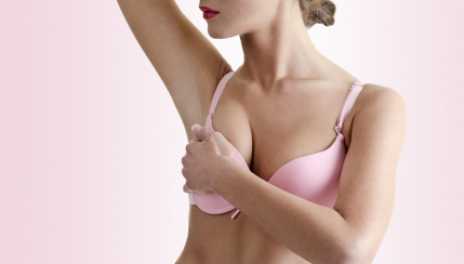 New Health Guide
New Health Guide
About 7 to 14 days prior to period, women suffer from breast tenderness. The breast tenderness before a period can range from mild discomfort to severe pain and discomfort. This is just one of the symptoms that a women may notice during PMS or premenstrual syndrome.
You may notice the pain expand from your breast to your underarm. The naturally changing hormone balance that occurs as women reach menopause may alter the symptom of tender breasts or even eliminate it.

There are two hormonal changes that cause breast tenderness before period. As your body produces more estrogen early to mid-cycle, you may have an enlargement of the breast ducts that can cause breast pain.
Around the 21st day of a 28 day cycle, your progesterone peaks as well. This causes the milk glands to increase in size, again causing some breast pain before period.
Benign breast changes, known as fibrocystic breast disease and PMS are both linked to premenstrual breast swelling. Almost all women will experience varying intensities of premenstrual breast tenderness throughout their life.
During the childbearing years, women may experience more severe symptoms. However, if you are on birth control pills you may not notice it as much. You will most likely have breast tenderness during PMS if there is a family history of it, you are eating a diet high in fats, or if you consume too much caffeine.
Most women will have breast tenderness as an annoying symptom, while others may have a more serious medical condition. The symptoms and severity can fluctuate quite a bit before and during the menstrual cycle. However, most often you will find that breast tenderness before period will disappear once the period begins.
If at any time you have concerns about the changes in your breasts, it is important that you consult your doctor.
Although most breast tenderness is not a symptom of a health concern other than your premenstrual cycle, there are times when you should discuss the swelling and pain with your doctor. Some breast swelling and tenderness could be a warning sign of an underlying health issue or infection.
If you notice any of the following, it is important that you contact your physician:
Your doctor will perform a complete physical exam of you and your breasts. Your doctor will most likely ask questions to help them better understand your symptoms. Some questions you may be asked include:
Your doctor will proceed to test for lumps and take notes about the lumps during a breast exam. You may also be asked if you complete home breast exams or if you know how.
Any abnormal changes detected by your doctor will be tested using a mammogram. A mammogram is a diagnostic test that uses an x-ray to view inside the breast. During the test, your breast will be placed between a plastic plate and an x-ray plate so that it can be compressed to get a clear image. You may feel temporary discomfort during the test.
If the abnormalities need to be examined further, your doctor may recommend a biopsy to determine if the lumps are cancerous.
Breast pain before period can be relieved by some really simple lifestyle changes. See if the following can help:
Using sports bra will help ease the breast tenderness before period when it is at its worst. You may even find that wearing the sports bra at night will give them extra support.
Eating low fat, low sodium, and high carbohydrate foods has been known to help eliminate some of the tenderness and pain. Reducing the amount of caffeine and alcohol you consume will help as well.
Eating a diet that is rich with greens and vegetables will help you relieve symptoms naturally without any medications, especially vegetables such as broccoli, spinach, collard greens, sweet potatoes, and brown rice.
There are many vitamins and minerals that aid in relieving breast pain during premenstrual syndrome, especially vitamin E and magnesium. The U.S. Department of health and Human Services Office on Women’s Health suggests that women consume more of each during PMS.
Some foods that are high in their vitamin E and magnesium content are:
Keeping with the natural relief, there are some herbs that help reduce the breast tenderness before period. You will find that many of these herbs are great steeped as tea and used to replace your caffeinated drinks. One of the best is dandelion tea as it is a diuretic which helps flush excess water from your body reducing the bloating sensation.
Others you may use to get the same effect are rosemary, juniper, and cypress. Evening primrose and chaste berry are great to add to the mix to help reduce the pain.
Along with the herbs, flower essences and essential oils have been found to help aid in reducing pain and breast tenderness before period. You may even want to try some grape seed or almond oil mixed with rosemary massaged directly onto your breasts.
If you are unable to treat the pain, swelling, and tenderness on your own, there are many effective over-the-counter NSAIDS (non-steroidal anti-inflammatory drugs). Acetaminophen, ibuprofen, and naproxen sodium are a few of the commonly used ones. You may also discover that these relieve cramping as well as relieving breast pain.
If you are not interested in becoming pregnant in the near future and suffer from breast pain, your doctor may prescribe you some form of birth control to aid in premenstrual pain and symptom relief.